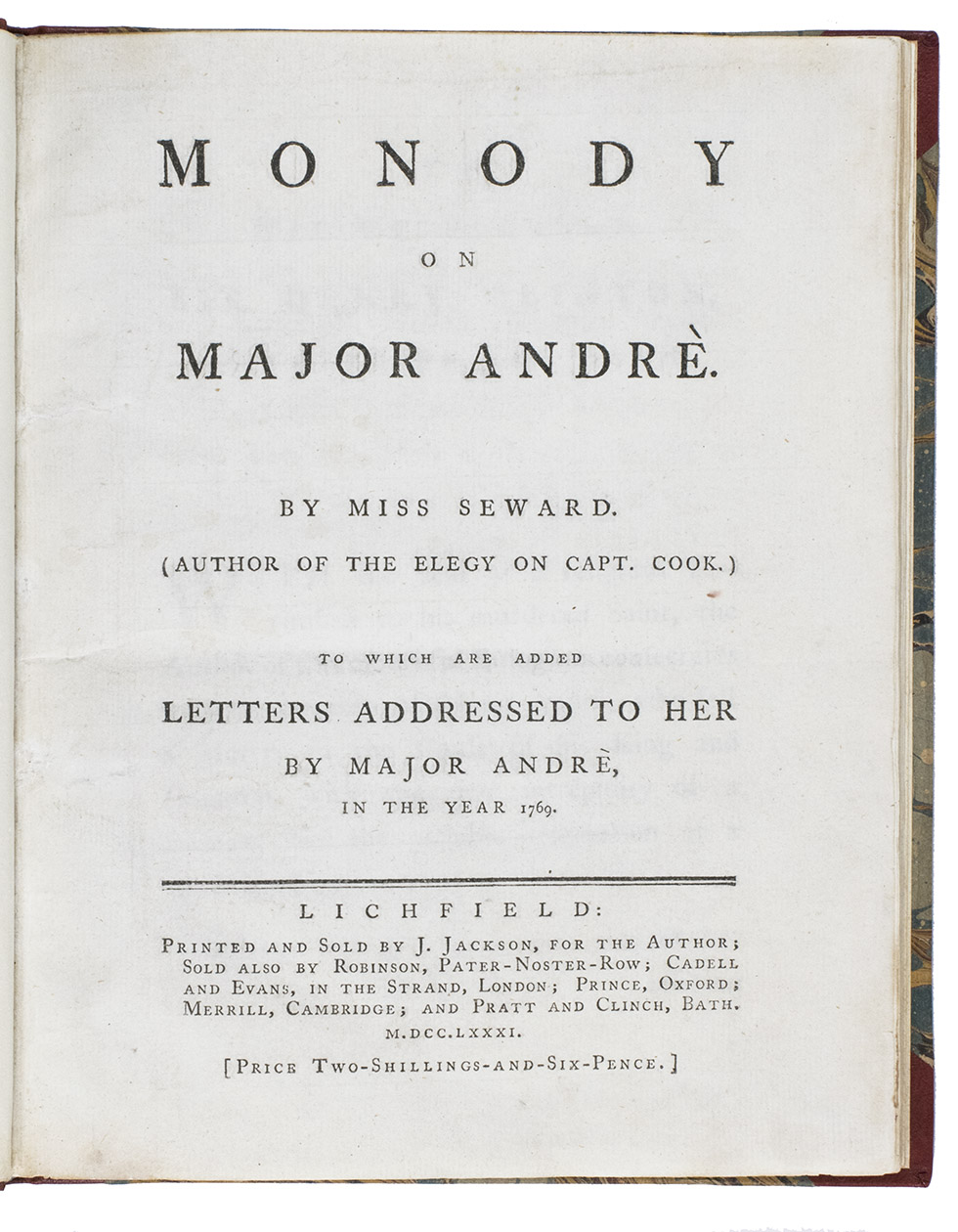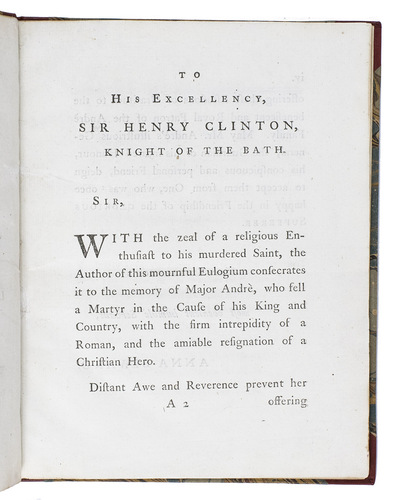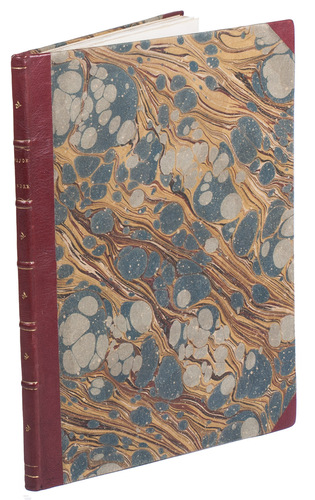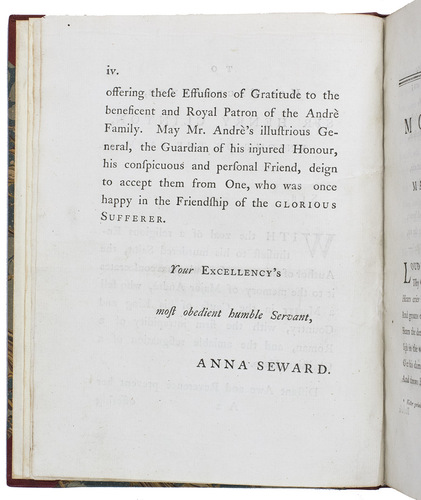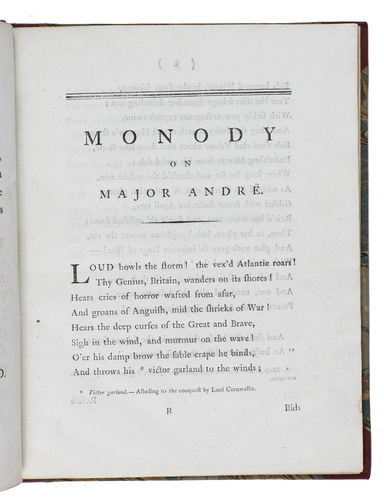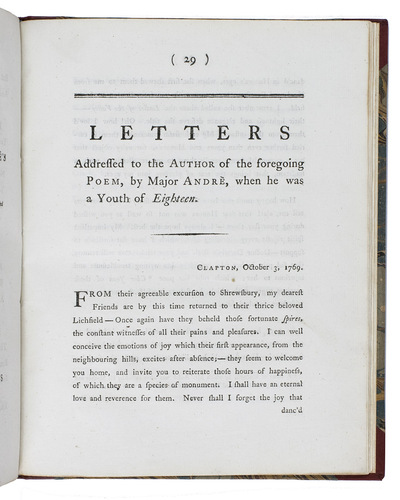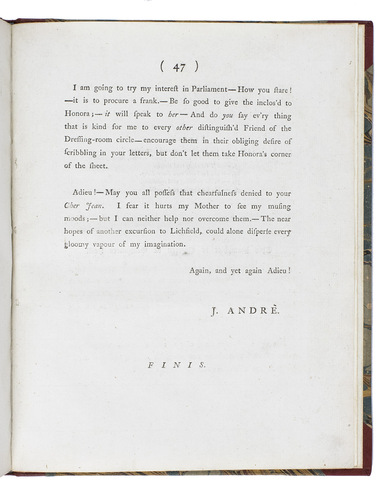SEWARD, Anna.
Monody on Major Andrè. To which are added letters addressed to her by Major Andrè in the year 1769.
Lichfield, Printed and sold by J. Jackson for the author [etc.], 1781. 4to. Half red morocco, marbled paper sides, gold-tooling on spine. IV, 47, [1] pp.
€ 2,950
First edition of the elegy on British army major in America, John André, by the English Romantic poet and women of letters Anna Seward (1742-1809). She was often called the Swan of Lichfield. In the present poem, she celebrates the courage, mental resilience and serenity of major John André, who was executed as a spy during the American War of Independence in 1780. She dedicated this elegy to Major André's superior, Sir Henry Clinton, and immediately makes her opinion on the matter clear with the following words: "With the zeal of a religious enthusiast to his murdered saint, the author of this mournful eulogium consecrates it to the memory of Major Andrè, who fell a martyr in the cause of his King and Country, with the firm intrepidity of a Roman, and the amiable resignation of a Christian hero." (p. III). The work contains a bitter attack on George Washington, who presided over the military board responsible for the conviction of Major André. "Remorseless Washington! the day shall come / of deep repentance for this barb'rous doom! / When injur'd Andrè's memory shall inspire / a kindling army with resistless fire;" (p. 25). The present work follows closely on the author's first published poem Elegy on Captain Cook (1780) and it went through several editions. A second edition and the first American edition (New York) were published in the same year as the present first edition and two other editions followed in Philadelphia (1788) and Boston (1798).
John André (1750/51-1780) was an officer (later major) in and spy for the British army in North America. He was "intimately connected with the poet Anna Seward and her literary coterie at Lichfield, where he met Honora Sneyd. They became engaged and courted for over a year before she left him for another man at a Christmas party in 1770. André's decision to pursue a military career has been attributed to this disappointment." (Oxford DNB). After having served as aide-de-camp to Major-General Charles Grey and taking part in several battles during the American War of Independence, he became aide-de-camp to Sir Henry Clinton, commander-in-chief of the British forces in America from 1778. André was then tasked to handle all correspondence between Clinton and American spies, in which capacity he came in contact with General Benedict Arnold. Arnold was plotting the betrayal of West Point (New York) to the British. André and Arnold met in person, in order for Arnold to provide André with all the details regarding the defences of West Point. For this meeting, André had to move behind American lines and due to unforeseen circumstances he was forced to hide on a local farm disguised as an American civilian, which put him at risk for being condemned as a spy under military law if he was to be found out. On his way back to British territory, André was captured and searched by three American militiamen, who then found the compromising documents regarding West Point's defences in his boots. "André was brought before a military board convened by George Washington at Tappan, New York. The board found that André had acted in the character of a spy, and he was sentenced to execution by hanging. [...] He died with a serenity that evoked the warmest admiration of the American officers, to whom, even during the short period of his captivity, he had greatly endeared himself. His actions were commemorated by a monument that was erected in Westminster Abbey, London, and in 1821 his remains were transferred to the spot." (Oxford DNB).
With the bookplate of Charles Walker Andrews on the front paste-down and a loosely inserted newspaper clipping of Major André's disinterment in 1821. With the author's name signed on page 28 (leaf E2v), probably in her own hand, as usual in most copies. Adams, American Controversy, 81-65a; ESTC T41382; Sabin 79477; for the author: Paula R. Backscheider, Eighteenth-Century Women Poets and Their Poetry: Inventing Agency, Inventing Genre, Baltimore, The Johns Hopkins University Press, 2005; for Major John André: Oxford DNB https://doi.org/10.1093/ref:odnb/512; for
Related Subjects:
